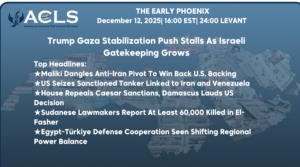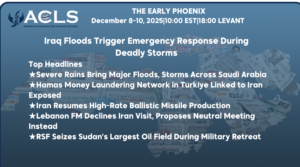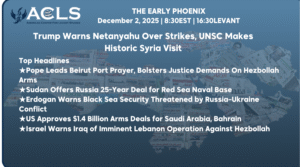TOP HEADLINES:
- Israel Threatened to Topple Assad if Syria Gets Involved in Gaza War
- Hamas Signals it May Accept Israel’s Latest Proposal for Hostage/Ceasefire Deal
- EU’s Borrell Says Some EU Countries Could Recognize Palestinian Statehood in May
- Iranian Regime Embraces, Exploits U.S. Campus Protests
- Erbil Says Iran-Backed Militias Attacked Kurdistan’s Gas Field
=======================
★ ISRAEL & PALESTINIAN TERRITORIES
-
EU’s Borell Says Some EU Countries Could Recognize Palestinian Statehood by End of May
Speaking at a Saudi-hosted ministerial conference on Gaza in Riyadh, EU foreign policy chief Josep Borell announced that several European countries plan to recognize the Palestinian state by the end of May. Concurrently, Saudi Arabia is facilitating discussions involving Arab, EU, and U.S. diplomats to address the Gaza war, with U.S. Secretary of State Antony Blinken expressing optimism for a ceasefire agreement involving the release of Israeli hostages.
-
Hamas Signals it May Accept Israel’s Latest Proposal for Hostage/Ceasefire Deal
A Hamas official informed AFP of no significant disagreements with Israel’s proposed hostage release and ceasefire. Negotiators are set to convene in Cairo Monday. Israeli Foreign Minister Katz suggested halting an invasion if Hamas agrees to the deal. Protests surged after videos of hostages pleading for release emerged. The proposed deal involves releasing hostages over three weeks in exchange for Palestinian prisoners and returnees. A temporary ceasefire would precede long-term negotiations, with IDF monitoring border crossings.
-
Smotrich Threatens Government Collapse Over Gaza Deal, Lapid Vows Opposition Support for Deal
Israeli Finance Minister Bezalel Smotrich sternly warned Prime Minister Benjamin Netanyahu against halting the Rafah operation, equating it with conceding victory and compromising Israel’s security. Smotrich characterized stopping the mission as detrimental not only to Israel’s position, but also to the safety and future of hostages left out of the Hamas negotiation deal. Meanwhile, opposition Leader Yair Lapid has pledged to back the government in approving a hostage agreement, despite threats from far-right ministers Itamar Ben Gvir and Bezalel Smotrich to exit Prime Minister Benjamin Netanyahu’s coalition over a proposed ceasefire with Hamas. Lapid affirmed on social media that his party, Yesh Atid, would contribute 24 votes needed for the government’s majority, emphasizing the urgency to “bring [the hostages] home.”
-
Diplomat Says Israel threatened to topple Assad regime if Syria gets involved in Gaza war
A western diplomat said Israel has issued a stern warning to the Assad regime in Syria, threatening to topple Assad’s government if it becomes involved in the ongoing Gaza war. This warning comes amid a recent escalation following an Israeli airstrike in Damascus, which targeted a building next to Iran’s consulate, killing several commanders of Iran’s Islamic Revolutionary Guard Corps. In response, Iran launched a significant missile and drone attack against Israel, heightening regional tensions. Assad has avoided direct involvement in the Gaza conflict, focusing instead on maintaining a delicate balance between its major allies, Russia and Iran.
-
Hamas Says its Leaders Will Relocate to Jordan if They Leave Qatar
Hamas leaders may relocate to Jordan if departing Qatar, says senior member Musa Abu Marzouk. Speculation has circulated about Hamas’s relocation to Iraq, Syria, or Turkey, but Abu Marzouk labeled these reports merely media pressure on Qatar. He highlighted Jordan’s support for Palestinian resistance and good relations with Hamas. Abu Marzouk urged Jordan and Egypt to sever ties with Israel in order to halt conflict in Rafah.
-
US Officials Believe Israel May Have Violated International Humanitarian Law
Senior officials in the U.S. State Department have raised concerns that Israel may have violated international humanitarian law during its ongoing military operations in Gaza. Internal memos to Secretary of State Antony Blinken from four department offices highlighted issues such as Israel’s handling of humanitarian aid and potential misuse of American support. The memos cited several instances where Israeli actions, including raids on civilian facilities and the obstruction of humanitarian aid, raised questions about compliance with international law. This has prompted discussions about possibly restricting U.S. military aid to Israel, reflecting a complex internal debate within the State Department on the matter.
=======================
★ IRAN
-
Iranian Regime Arrests Former National Security Chief’s Nephew on Charges of Embezzling $2.1B
Mo’oud Shamkhani, former deputy head of Iran’s Arvand Free Zone and nephew to ex-SNSC Secretary Ali Shamkhani, has been detained in Abadan for his involvement in a $2.1 billion embezzlement case. The Shamkhani family, including his sons, brother, and son-in-law, has faced significant public scrutiny and criticism in Iran over their financial activities. Mo’oud Shamkhani also holds a background as an admiral in the Iranian navy and a former commander in the IRGC.
-
Iranian Regime Embraces, Exploits U.S. Campus Protests
Iran is exploiting pro-Palestinian protests across U.S. campuses, according to Iranian state media. As domestic dissent grows over Iran’s own suppression of student voices, the U.S.-based protests are presented as a display of solidarity with Palestine, enhancing Iran’s stance as a defender of Palestinian rights. This regime strategy also serves as a distraction from Iran’s repressive actions at home. The situation reveals a stark hypocrisy, as Iranians on social media decry the regime’s celebration of U.S. academic freedom while curtailing their own.
-
Iran Delivers Three Naval Vessels to Venezuela
Iran has successfully delivered three 90,000-ton vessels to Venezuela, fulfilling an order that highlights Iran’s growing capabilities in shipbuilding. Ali Akbar Safaei, head of the Iranian Ports and Maritime Organization, confirmed the delivery and emphasized Iran’s long-standing maritime relations with Venezuela. Safaei also mentioned ongoing discussions with Cuba about potential shipbuilding projects, reflecting Iran’s ambition to expand its maritime industry services to other Latin American nations.
-
IRGC Unveils New Suicide Drone to Enhance Ground Operations
The Islamic Revolution Guards Corps (IRGC) has introduced a new suicide drone, poised to significantly enhance its ground forces’ combat effectiveness. This loitering munition, similar in design to the Russian ZALA Lancet drone, is equipped with electro-optical systems and an integrated warhead, optimizing it for counter-ambush tasks and various military operations. Its compact size allows easy transport by troops, reflecting the IRGC’s continued investment in advanced drone technology to improve operational flexibility and capability.
=======================
★ YEMEN
-
U.S. Military Engages Drones Over the Red Sea
The U.S. Central Command reported that its forces engaged five drones over the Red Sea, posing threats to U.S. and allied naval and commercial vessels. This confrontation follows recent hostilities, including a Houthi attack on a British oil tanker and the downing of an American MQ9 drone by Houthi forces. The increase in maritime threats, with over 100 vessels targeted since November 19, has prompted retaliatory airstrikes by the U.S. and the UK to curb Houthi capabilities threatening global maritime commerce.
=======================
★ IRAQ
-
Former PM Maliki Affirms Says Kurdistan Region Will Determine Its Own Election Schedule
Speaking at a press conference, Nouri al-Maliki, leader of Iraq’s State of Law Coalition, said that the Kurdistan region was in charge of setting its own election guidelines, including their timing. He said the federal government will continue funding the salaries of Kurdistan region employees. Referring to attacks by Iran-backed forces against Kurdistan’s major gas plant, Maliki said Iraq will not tolerate any foreign aggression on its territory. He expressed optimism about fostering stronger inter-regional cooperation and upholding constitutional commitments.
-
Erbil Accuses Iran-Backed Militias of Drone Attack on Kurdistan’s Major Gas Field
Kurdistan Regional Government officials have accused Iran-backed factions within the Popular Mobilization Forces of orchestrating the recent drone attack on the Kormor gas field, which resulted in four fatalities and extensive material damage. Prime Minister Mohammed Shia Al-Sudani has committed to pursuing those responsible. The attack, believed to be economically and politically motivated, is seen as an attempt to undermine Iraq’s gas self-sufficiency and disrupt Baghdad-Erbil relations over gas agreements.
-
Former Iraqi Defense Chief Calls for Missile Defense in Kurdistan
General Babikir Zebari, the former Chief of Staff of the Iraqi army, has emphasized the necessity of air defense systems to protect Kurdistan’s vital oil and gas resources from drone attacks. He highlighted the ongoing threat from militias that compromise regional stability and economic security. Zebari argued for international support to equip the Kurdistan Region with anti-missile technology, noting the critical role of the Khor Mor gas field in national energy supply and the broader economic implications of potential future attacks.
-
Iraqi Lawmakers Demand Expulsion of U.S. Ambassador After U.S. Criticism of Anti-LGBT Law
Members of Iraq’s Coordination Framework have initiated a campaign to declare U.S. Ambassador Alina Romanowski as persona non grata, accusing her of meddling in Iraq’s internal affairs. The movement follows her comments on Iraq’s new anti-LGBT legislation, which lawmakers argue infringes upon national sovereignty. Over 61 signatures have been collected to urge the government to expel her, criticizing her involvement in domestic legislative processes and her recent statements opposing the law aimed at preserving Iraqi family values and principles.
=======================
★ SYRIA
-
Bahraini Foreign Minister Meets Bashar al-Assad in Historic Visit to Damascus
In a landmark visit, the first since the onset of the Syrian revolution in 2011, Bahrain’s Foreign Minister Abdul Latif bin Rashid Al Zayani met with Syrian President Bashar al-Assad in Damascus. The visit aimed to discuss bilateral relations and preparations for the upcoming Arab League summit scheduled for May 16 in Manama. This meeting underscores a warming of ties and coordination ahead of the summit.
-
Tensions Rise Between Turkey and HTS Over Border Checkpoint Dispute
Tensions are rising in northwestern Syria as the Turkish army is sending reinforcements following Hay’at Tahrir al-Sham’s refusal to establish Turkish-supervised border points. Turkish sources report troop movements near the Bab al-Hawa crossing, aiming to establish new checkpoints. Meanwhile, an earlier meeting between Turkish officers and Hayat Tahrir al-Sham leaders failed to reach a border control agreement. This development is part of Ankara’s efforts to curb human smuggling into Turkey. Both sides are bolstering their positions at the Ghazawiyah crossing, with Tahrir al-Sham mobilizing armed members and heavy weapons in response to Turkish and Russian pressures. The situation remains volatile, with recent civilian casualties from cross-border shelling and a Turkish soldier injured in regime attacks near Saraqib.
-
French Court Charges ISIS Leader’s Wife for Involvement in Yazidi Atrocities
The French judiciary has escalated charges against “Sonia M.,” the ex-wife of an ISIS leader, from complicity in crimes against the Yazidi community to a felony. She is accused of enslaving a Yazidi teenager in Syria. Despite her denials of abuse, the victim recounted severe mistreatment and sexual violence at the hands of “Sonia M.” and her husband. Sonia M. denies mistreatment during her interrogation, attributing any wrongdoing to her ex-husband. The case sheds light on ISIS’s systematic genocidal campaign against the Yazidis in 2014, as documented by UN investigations. Thousands faced death or enslavement, constituting clear evidence of genocide, according to UN findings.
-
Iran Demands Assad Regime Repay $50 Billion Debt to Tehran
Iran is pressuring Syria to implement agreements granting Iran strategic investments in Syria to settle debts totaling $50 billion. These agreements are seen by Damascus as unfavorable, exploiting Syria’s economic plight while blocking potential financial gains from other nations. Iran, acting as Syria’s main economic support, aims to recover its debts amidst Syria’s severe economic challenges exacerbated by international sanctions and regional economic downturns. Leaked documents reveal Iran’s significant influence and detailed plans involving economic and logistical support to Syria, including oil supplies and economic coordination among Iranian organizations operating in Syria. These revelations show Iran’s urgency in recovering owed debts despite Syria’s challenging economic conditions.
-
Signs of Gasoline Crisis in Damascus: Delayed Notices, Reduced Supplies
Residents in Damascus, Syria, express concern over delayed gasoline allocation messages, impacting fuel distribution in government-controlled areas. Public vehicle notices arrive 6 to 8 days late, while motorcycles and private cars face delays of 11 to 13 days. Reduced fuel quantities and supplies contribute to the setbacks, according to officials. Price hikes are scheduled to follow, with the Ministry of Internal Trade announcing the second fuel price increase within two weeks.
=======================
★ LEBANON
-
Hamas Military Wing Launches Attacks on Israel from Southern Lebanon
Al-Qassam Brigades, the military wing of Hamas, announced a concentrated rocket attack on the Eastern Brigade Command Center 769 (Gibor Camp) in northern Israel, launched from southern Lebanon. This military action coincided with Hamas’ pending response to a truce proposal in the ongoing Gaza conflict, which includes hostage release conditions. Following the attack, Israel activated northern region air raid sirens. Meanwhile, the Israeli military announced airstrikes on Hezbollah’s operational infrastructure in southern Lebanon, targeting operational facilities in Jabal Blat and military buildings in Marwahin. Concurrently, Israeli forces conducted artillery shelling on the outskirts of Alma al-Shaab and Naqoura, accompanied by flares over several southern villages. The strikes, which occurred before midnight, caused significant property damage, affecting agricultural lands and homes. This ongoing exchange of fire with Hezbollah has been a near-daily occurrence since the Gaza conflict began on October 7.
-
Lebanon Awaits French Proposal on Israel-Hezbollah Conflict
Lebanese Parliament Speaker Nabih Berri revealed that Lebanon has not yet received a proposed French resolution for the Israel-Hezbollah conflict, expected ahead of French Foreign Minister Stéphane Séjourné’s recent visit. Séjourné assured Berri the document would arrive imminently for review. Meanwhile, Berri emphasized the link between the Gaza conflict and Lebanon’s stability, noting that cessation in Gaza would quiet the Lebanese front. Additionally, Berri stated that U.S. mediator Amos Hochstein, recently in Israel, has not scheduled a visit to Lebanon nor requested a meeting.
=======================
★ GULF REGION
-
Arab Ministerial Committee Calls for Sanctions and Arms Embargo on Israel
During a session in Riyadh, an Arab-Islamic ministerial committee urged the international community to impose effective sanctions on Israel, including halting arms exports, in response to violations of international law and alleged war crimes in Gaza and the West Bank. Saudi Foreign Minister Prince Faisal bin Farhan warned of severe consequences if military operations in Gaza expand. The committee emphasized the urgent need for intensified Arab and Islamic cooperation to promptly end the conflict, protect civilians, and ensure sustainable humanitarian aid throughout Gaza.
-
War Threatens UAE Port Project in Sudan
The ongoing conflict in Sudan may lead to the cancellation of previous investment agreements with the UAE, including the Abu Amama Port project on the Red Sea. Sudanese Finance Minister Jibril Ibrahim indicated that the memorandum of understanding for the port was non-binding and could be revoked due to the war, amidst accusations of UAE’s involvement in funding conflict against the Sudanese government. Analysts suggest the current war impedes Sudan’s ability to develop new ports independently, highlighting the strategic importance of the Abu Amama project.
=======================
★ EGYPT AND NORTH AFRICA
-
Egypt Upgraded in International Finance Ranking
The World Bank’s International Finance Corporation has upgraded Egypt’s rating to “advanced application” for sustainable finance. This recognition follows substantial efforts by the Central Bank of Egypt to boost sustainable financing in the banking sector. Key initiatives included issuing guidelines for sustainable financing, enhancing employee capabilities, and aligning regulatory instructions with international standards. These efforts aimed to prepare the banking sector for greater sustainability and to address the challenges and opportunities in sustainable financing.
-
Islamic Development Bank’s Financing in Egypt Reaches $22 Billion
The Islamic Development Bank’s financing portfolio in Egypt has reached $22 billion, spanning 395 projects in various sectors such as electricity, infrastructure, and transportation. Hala Al-Saeed, Egypt’s Minister of Planning and Economic Development, highlighted this during the Bank Group’s meetings in Riyadh. The financing also supports Egyptian export growth, which has increased by 20% to $52 billion. Additional efforts include evaluating government headquarters in downtown for competitive offerings, with potential conversion into hotel spaces and a creativity center.
=======================
★ TURKIYE
-
Istanbul’s Influential Mayor İmamoğlu Calls Hamas a Terrorist Organization
CHP’s Istanbul Mayor Ekrem İmamoğlu stirred controversy by labeling Hamas a “terrorist organization” in an interview with CNN International. İmamoğlu’s remarks came amid Hamas’ armed resistance against Israeli occupation and atrocities, notably the Aqsa Operation initiated on October 7. Despite Israeli assaults on civilians and humanitarian facilities since October 7, causing thousands of casualties and immense suffering in Gaza, İmamoğlu’s characterization of Hamas faced backlash, with some contrasting it with President Erdoğan’s supportive stance on Hamas.
-
İKB Group Provides Turkey with $6.3 Billion Financing
Turkey has secured significant external funding with the Islamic Development Bank (IDB) Group allocating $6.3 billion for projects spanning 2024-2026. Treasury and Finance Minister Mehmet Şimşek highlighted this support, emphasizing its alignment with Turkey’s economic agenda. The funds target various sectors such as education, healthcare, transport, finance, agriculture, industry, energy, and infrastructure. Since its inception, the IDB Group has provided Turkey with $12.9 billion, ranking it fourth among countries benefiting from the bank’s favorable credit terms.
-
Turkey-Iraq Pact Reportedly Gives Turkey a Free Hand in Designated Zone of Northern Iraq
The Iraq-Turkey security agreement allows Turkish forces to conduct military operations against the PKK within a specific area inside Iraq, in exchange for increased water supply from Turkey to Iraq. The deal, critiqued for compromising Iraqi sovereignty, encompasses military actions in a zone measuring a 300 km by 40 km. The agreement aims to address PKK activities in certain mountainous regions of Iraq and is part of broader Turkish ambitions to suppress the PKK, which is designated as a terrorist organization by Turkey, the United States, and the EU. The deal also involves cooperation on modern irrigation techniques and optimizing water use in Iraq’s agriculture.
-
In an About Face, Turkey Reportedly Backs Mark Rutte’s NATO Secretary-General Bid
Turkey will support Dutch Prime Minister Mark Rutte’s candidacy for NATO Secretary-General, reports Dutch news agency ANP, citing NATO diplomats. Turkey joins nations like the US, UK, France, and Germany in backing Rutte, while four nations remain undecided. Rutte seeks to succeed Jens Stoltenberg in the role.
=======================
📌 Incase you missed it,
📰 THE EARLY PHOENIX April 25 , 2024
=======================
🔗 Follow the latest news from the American Center for Levant Studies via Google News



